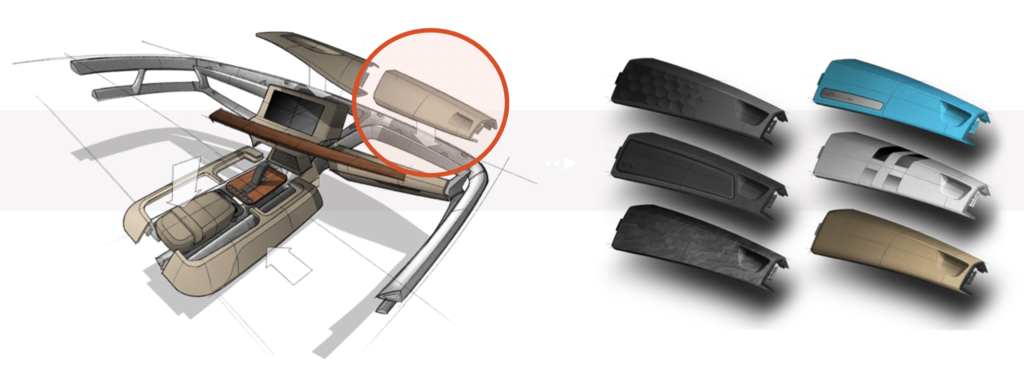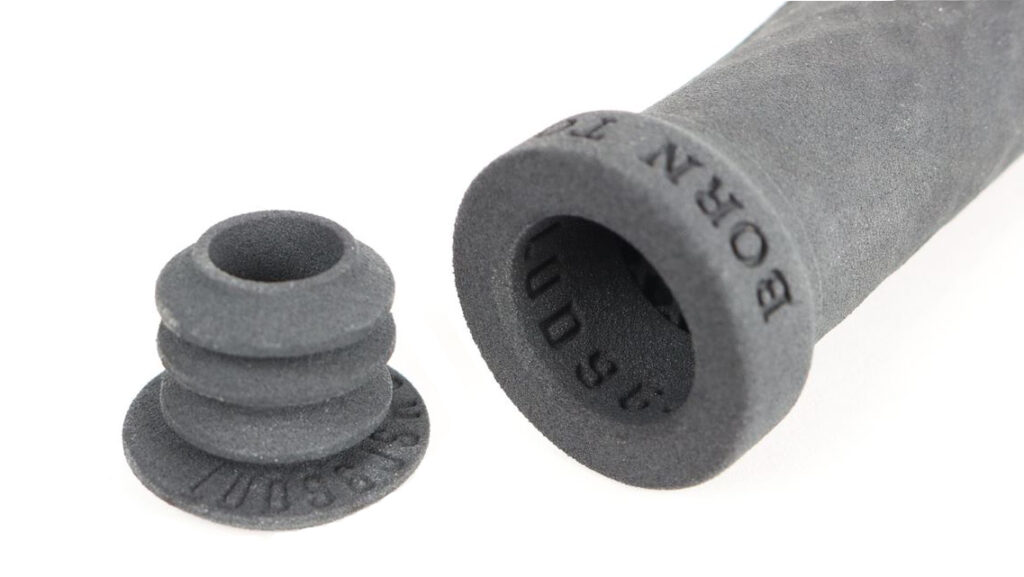Consumers are searching for a personal experience now that the options for mobility are numerous. Depending on their lifestyle, ownership has a different meaning for every individual. How do OEMs respond to the tendency of unique driving experiences for every end-customer while also standing out amongst the competition? That is why it is becoming more urgent than ever for OEMs to find the correct answer to the question: What does the future of cars look like?
Bespoke has long been the staple of luxury but now, with new digital manufacturing technologies and Twikit software innovation, creating a personalized, individualized and unique product for each customer is within reach. We have come a long way from Mr. Ford’s “Car in any color, so long as it’s black.”

To illustrate the case of 3D printed customized car parts through an end-to-end digital workflow, we focused on an exterior aspect of car design. Wheel blades are the most impactful visual statement and set the mood for the drive.
Enabling brands to tap into & capture the value of mass customization
With technologies like 3D printing, laser cutting, and CNC, advanced customization of interior and exterior elements is a solid opportunity for car brands, tier ½ suppliers and after-market players.
The Twikit software platform is created to bring digital manufacturing applications to scale and production for the automotive industry. It enables brands and industries to tap into and capture the value of mass customization of on-demand, digitally manufactured personalized products.
Supporting the full customization journey
TwikBot’s universal software supports the full customization journey-from product input (where all personalization assets are created) to the front-end exploration culminating in top-of-the-line production results. On the front-end, Car configurators can be set up as virtual showrooms where products are completely customizable.

To illustrate the case of 3D printed customized car parts through an end-to-end digital workflow, we focused on an exterior aspect of car design. Wheel blades are the most impactful visual statement and set the mood for the drive.
The unique customer experience
The end-customer visualizes the part that they co-design through an extensive range of customization options available via the configurator. When the order is placed, the production file is automatically sent to the right production facility through the Twikit Live platform.
On-demand and de-centralized production
Parts can be ordered from anywhere via a front-end interface and produced on-demand and de-centrally due to the distributed workflow of the Twikit solution. Digitalizing the manufacturing process and utilizing 3D printing offer the solution by (re)producing parts in sustainable materials in an efficient and labor-reductive way.
Extensive personalization & vehicle modularity made possible
The future of automotive is both personalization and vehicle modularity – a blank canvas that the end-consumer can make their own. While involving the buyer in the design process emerges them into the brand experience, letting them compose their own car takes customer satisfaction to a new level. This experience adds value through extensive customization, made possible by the Twikit solution.

Next generation vehicle (model) lines are being developed with modularity and personalization in mind by utilizing new assembly tech that allow for interchangeability of parts.
Vehicle modularity will shift from a sub-modular system (e.g., MLB system of the Volkswagen Group) to a full-modular system. Different interior and exterior modules will become replaceable and highly individualizable, enabling OEMs to improve customer experience and cut down on engineering costs, and extend the vehicle lifetime.
Seize new product opportunities through Twikit’s solution
The personalization of vehicles is an opportunity for customer self-expression, co-creation, and a truly unique experience. But more than that, it is also a way for brands to establish new business models, open new revenue streams, and offer new products.
For example, car parts can easily be made from sustainable and recycled materials through digital manufacturing methods. Sustainability has become increasingly important as Volvo announced that 25% of plastics used in a vehicle will be made from recycled material by 2025. Digital manufacturing also allows for vehicle refurbishing to be made easy.
On the other hand, personalization doesn’t have to end with offering vehicles customized based on the end-customers wishes. To maintain and develop the connection with the customer, the brand can offer limited edition designs or seasonal updates. Furthermore, if the vehicle is re-sold, it could be easily de-personalized or updated to the new buyer’s taste, for example, as part of a Certified Pre-Owned vehicle program.
Product possibilities reaching beyond commercial products
The possibilities for mass customization with Twikit technology reach beyond customer-facing parts to jigs, fixtures, mechanical parts, wire harnesses, and spare parts. Again, providing new opportunities for the automotive industry as well as increasing manufacturing efficiency for the creation of these parts.

The unique identifier on this part is imprinted during the 3D printing process
Twikit technology allows for individual and unique ID identifiers to be physically added to each part. This ID can either be integrated into the spare part or printed on it as a barcode, QR code, design, or symbol. In turn, this unique identifier can be used to track a part throughout the production, provide origin information, act as an anti-counterfeit measure, or assist in the logistics for assembly.
Connect with Twikit for the automotive industry of the future
The Twikit cloud-based software solution enables an end-to-end automated digital workflow for individualized parts at scale and on-demand. The flow automates the process, eliminates cost-heavy inventories, manufacturing dependencies, and physical warehouses while optimizing production efficiency.